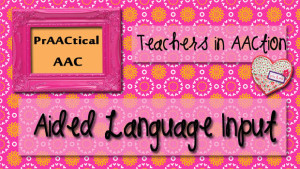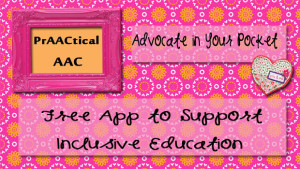February 24, 2012
by Carole Zangari -

We love people who take a chance and put themselves out there to learn and grow. This video of teacher Amy Powell, who had 2 hours of Minspeak instruction before her “friends” caught her on video, gets a double thumbs up from us. Using the Smart Board to Model AAC for the learners is a great way to make learning big and real. Direct link to video: https://www.youtube.com/watch?v=XQmWw3GprW8&feature=related
Filed under: PrAACtical Thinking
Tagged With: aided language input, schools
February 17, 2012
by Carole Zangari -

The thought of an IEP meeting fills many parents we know with dread and anxiety, particularly if they are in a district where inclusive education is not running very smoothly. Jillian, a very passionate and competent mom of a youngster who uses high tech AAC, was pretty blunt about it. “I’d rather have root canal,” she said, and the parents within earshot gave her a round of applause. — So when we came across an app that provides support to families in this process, we had to check it. Developed at the Syracuse University School of Education, iAdvocate is an app designed to share information that parents can use to support their request for inclusive education. It lists some of the common roadblocks that families sometimes encounter, such as: “Your child needs small group instruction with few distractions and that can only be provided in a separate classroom.” “Meeting your chid’s needs is... [Read More...]
Filed under: PrAACtical Thinking
Tagged With: Apps, IEP, schools
February 16, 2012
by Carole Zangari -

One of the reasons that we fell in love with AAC community was the seemingly boundless capacity for creativity. Creativity is something that most people associate with art and writing more than clinical work, but the reality is that creative problem-solving is a key skill among successful SLPs. As clinical educators, we’re always interested in finding ways to help our students (future SLPs) to analyze a problem situation and come up with a host of possible solutions. Creativity is enormously valuable in that process and we’re always looking for great examples of creative approaches to tough AAC problems. – So I was very intrigued by the way that educators, administrators, and therapists in British Columbia set out to help high school students with AAC needs master their systems. Approximately 5 years ago, SET-BC began the process of developing an AAC course that could be used for credit in provincial high... [Read More...]
Filed under: PrAACtical Thinking
Tagged With: intervention, schools
February 15, 2012
by Carole Zangari -

This is the first in an occasional series in which we attempt to address questions posed to us by families, SLPs, and others who are providing AAC services. The first question we’ll tackle came from a school administrator who asked about what happens to AAC devices during transitions. — The Situation: School district A had purchased an AAC device for a student following sound educational practices, such as a feature match assessment in which all key stakeholders played a significant role. The student then moved to a different part of the state but the device did not. The administrator from School District B wondered, “Shouldn’t the student be able to keep her AAC device?” The administrator from the original school district didn’t think so. The device was costly, she reasoned, and while it had been customized for this particular student, it could easily be re-programmed for a different student. Budgets are... [Read More...]
Filed under: PrAACtical Thinking
Tagged With: FAQs, schools



